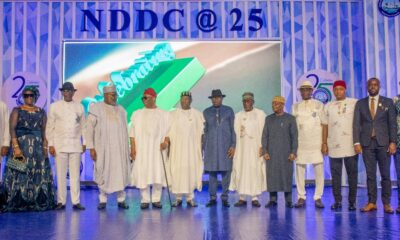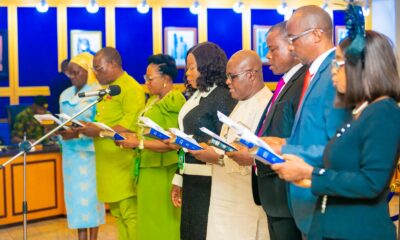Opinion
Privatising Nigeria’s Petroleum Industry (111)

Petroleum products
supply should really be considered as a public service obligation and service of general common interest to Nigeria; hence, the government should see itself as under obligation to make them available, reliable and sustainable.
In the United Kingdom, for example, electricity and gas supply to British citizens are so considered as public service obligation by the British Government, hence, every citizen in the UK is entitled to be supplied of these products but also required to pay reasonable prices as determined by the markets, not as fixed by government. Therefore, the provision of energy security infrastructure is both the function of the government and the industry but more of the government; hence it may be the reason why governments will usually intervene in the sector globally.
It is also the responsibility of the government to set the right legal framework that could reduce the dependence on petroleum by diversifying to renewable technologies and solid mineral sector.
Nigeria is now poor with rapidly depleting sovereign wealth fund, its national reserve, and hence the country needs enough capital to engage in alternative energy development. It is important that removing subsidy might help to save funds needed for diversification of Nigeria’s energy resource base.
Meanwhile, under the deregulated industry, which envisions the removal of subsidies by government, government would be expected to play a passive role while leaving the NNPC, IOCs, and independent marketers to directly provide petroleum services without fixing prices for them. However, the government should be ready to guarantee payment for spare capacities, and ensure cost recovery for the providers of services to the domestic sector, assuming the price fixed by the government is inadequate for the providers of petroleum products to supply domestic market with minimal profit margin.
This may explain why it is difficult to understand the policy direction of the government in fixing product price for the PMC as its supposed intention was for market forces of demand and supply to regulate and determine prices.
One advantage of the current pseudo-deregulation approach is that the price band would make the importers not to sell above the government regulated price of N145. However, there would be no guarantee that they might not sell above this range, if the international products price is higher than their expected margin. When this is the case, only NNPC outlets would sell PMS below N145 and Nigerians would complain that the industry is not efficiently managed.
Thus, taking into account that all foreign import of petroleum products may not be from one country or one source, it would be neater for the government to remove the pump. price sealing as the market would regulate itself in due course.. The success story of the telecom sector would have been a good teacher to our able. economic advisers on this matter.
‘However, keeping the price of kerosene and diesel at normal. price margin is a good and sensible decision. This is because the poor makes use of kerosene to meet his domestic needs more than the rich who have an average of four cars on the road at the same time.
The increase in price of petrol might inculcate a sensible conduct for energy conservation and a win win game for environmental protection in Nigeria. This is as a result of the likely reduction in the number of cars that would ply the roads in the era of scarcity. More cars on the road would contribute more air pollution and lead to the increase in climate change risks for the country.
Again, making kerosene product more available than petrol would promote sustainable environment. This is because the rural poor would not have to fell more wood for his energy uptake thereby conserving the environment. Similarly, an affordable and realiable supply of diesel which is mainly used by industries, will also encourage the manufacturing sector. Hence, the Federal Government should be applauded for retaining the old prices for these products.
On the whole, it is important for government to set out early its economic policy framework for the petroleum industry and in a more predictable manner; although, it may be difficult for government to cease from intervention in the industry. However, it is high time for NNPC to be fully commercialised. Government may still maintain its control by holding golden share in the commercialised NNPC.
Again, in order to have a sustainable petroleum industry, the need for regulatory stability cannot be over emphasised. The PIB must be passed without further delay .Although, we argued that the recent price hike for PMS is ill timed, Nigeria must be able to internalise the cost of production and supply of petroleum products by promoting a sustainable consumption culture. This would ensure fewer cars on the road which will drive down the supply for PMC.
Finally, should have been a proper consultation with Nigerians on this issue, especially given the backdrop of unpaid wages, biting economic hardship and social vices plaguing many states in Nigeria.
Dr Dike is a senior lecturer, RSUST, Port Harcourt.
Samuel C. Dike
Opinion
Why Reduce Cut-Off Mark for C.O.E ?
Opinion
Welcome! Worthy Future For R/S
Opinion
Restoring Order, Delivering Good Governance
The political atmosphere in Rivers State has been anything but calm in 2025. Yet, a rare moment of unity was witnessed on Saturday, June 28, when Governor Siminalayi Fubara and Minister of the Federal Capital Territory, Chief Nyesom Wike, appeared side by side at the funeral of Elder Temple Omezurike Onuoha, Wike’s late uncle. What could have passed for a routine condolence visit evolved into a significant political statement—a symbolic show of reconciliation in a state bruised by deep political strife.
The funeral, attended by dignitaries from across the nation, was more than a moment of shared grief. It became the public reflection of a private peace accord reached earlier at the Presidential Villa in Abuja. There, President Bola Ahmed Tinubu brought together Governor Fubara, Minister Wike, the suspended Speaker of the Rivers State House of Assembly, Martin Amaewhule, and other lawmakers to chart a new path forward.
For Rivers people, that truce is a beacon of hope. But they are not content with photo opportunities and promises. What they demand now is the immediate lifting of the state of emergency declared in March 2025, and the unconditional reinstatement of Governor Fubara, Deputy Governor Dr. Ngozi Odu, and all suspended lawmakers. They insist on the restoration of their democratic mandate.
President Tinubu’s decision to suspend the entire structure of Rivers State’s elected leadership and appoint a sole administrator was a drastic response to a deepening political crisis. While it may have prevented a complete breakdown in governance, it also robbed the people of their voice. That silence must now end.
The administrator, retired naval chief Ibok-Ette Ibas, has managed a caretaker role. But Rivers State cannot thrive under unelected stewardship. Democracy must return—not partially, not symbolically, but fully. President Tinubu has to ensure that the people’s will, expressed through the ballot, is restored in word and deed.
Governor Fubara, who will complete his six-month suspension by September, was elected to serve the people of Rivers, not to be sidelined by political intrigues. His return should not be ceremonial. It should come with the full powers and authority vested in him by the constitution and the mandate of Rivers citizens.
The people’s frustration is understandable. At the heart of the political crisis was a power tussle between loyalists of Fubara and those of Wike. Institutions, particularly the State House of Assembly, became battlegrounds. Attempts were made to impeach Fubara. The situation deteriorated into a full-blown crisis, and governance was nearly brought to its knees.
But the tide must now turn. With the Senate’s approval of a record ?1.485 trillion budget for Rivers State for 2025, a new opportunity has emerged. This budget is not just a fiscal document—it is a blueprint for transformation, allocating ?1.077 trillion for capital projects alone. Yet, without the governor’s reinstatement, its execution remains in doubt.
It is Governor Fubara, and only him, who possesses the people’s mandate to execute this ambitious budget. It is time for him to return to duty with vigor, responsibility, and a renewed sense of urgency. The people expect delivery—on roads, hospitals, schools, and job creation.
Rivers civil servants, recovering from neglect and under appreciation, should also continue to be a top priority. Fubara should continue to ensure timely payment of salaries, address pension issues, and create a more effective, motivated public workforce. This is how governance becomes real in people’s lives.
The “Rivers First” mantra with which Fubara campaigned is now being tested. That slogan should become policy. It must inform every appointment, every contract, every budget decision, and every reform. It must reflect the needs and aspirations of the ordinary Rivers person—not political patrons or vested interests.
Beyond infrastructure and administration, political healing is essential. Governor Fubara and Minister Wike must go beyond temporary peace. They should actively unite their camps and followers to form one strong political family. The future of Rivers cannot be built on division.
Political appointments, both at the Federal and State levels, must reflect a spirit of fairness, tolerance, and inclusivity. The days of political vendettas and exclusive lists must end. Every ethnic group, every gender, and every generation must feel included in the new Rivers project.
Rivers is too diverse to be governed by one faction. Lasting peace can only be built on concessions, maturity, and equity. The people are watching to see if the peace deal will lead to deeper understanding or simply paper over cracks in an already fragile political arrangement.
Wike, now a national figure as Minister of the FCT, has a responsibility to rise above the local fray and support the development of Rivers State. His influence should bring federal attention and investment to the state, not political interference or division.
Likewise, Fubara should lead with restraint, humility, and a focus on service delivery. His return should not be marked by revenge or political purges but by inclusive leadership that welcomes even former adversaries into the process of rebuilding the state.
“The people are no longer interested in power struggles. They want light in their streets, drugs in their hospitals, teachers in their classrooms, and jobs for their children. The politics of ego and entitlement have to give way to governance with purpose.
The appearance of both leaders at the funeral was a glimpse of what unity could look like. That moment should now evolve into a movement-one that prioritizes Rivers State over every personal ambition. Let it be the beginning of true reconciliation and progress.
As September draws near, the Federal government should act decisively to end the state of emergency and reinstate all suspended officials. Rivers State must return to constitutional order and normal democratic processes. This is the minimum requirement of good governance.
The crisis in Rivers has dragged on for too long. The truce is a step forward, but much more is needed. Reinstating Governor Fubara, implementing the ?1.485 trillion budget, and uniting political factions are now the urgent tasks ahead. Rivers people have suffered enough. It is time to restore leadership, rebuild trust, and finally put Rivers first.
By: Amieyeofori Ibim
Amieyeofori Ibim is former Editor of The Tide Newspapers, political analyst and public affairs commentator
-
News12 hours ago
NOA Set To Unveil National Values Charter — D-G
-
Politics9 hours ago
2027: Group Vows To Prevail On Diri To Dump PDP For APC
-

 Features12 hours ago
Features12 hours ago25 Years After: NDDC Celebrates Milestones Of Impactful Development
-
Business13 hours ago
NCDMB Promises Oil Industry Synergy With Safety Boots Firm
-

 News10 hours ago
News10 hours agoRivers Police Arrest Notorious Cultist, Recover Sophisticated Ammunition
-
Niger Delta12 hours ago
Adopt African System Against Crime, Don Urges Security Agencies
-

 News8 hours ago
News8 hours agoIbas Inaugurates RSIEC, Service Commissions, Healthcare Board In Rivers …Charges Appointees To Embrace Principles Of Service
-
Rivers11 hours ago
Monarch Cautions Youths Against Illicit Drug Consumption

